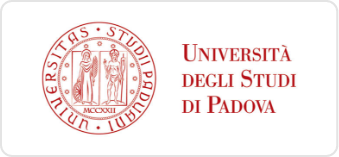UNIVERSITÀ DEGLI STUDI DI PADOVA (UNIPD)
Expertise: nanotoxicology, in vitro 3D cell culture models. PARTICIPANT & WP LEADER

UNIPD is composed of 32 departments that promote and coordinate research activities and courses, alongside 70 Research and Service Centres. It trains researchers via 37 doctoral courses and cooperates with several Italian and foreign entities, participates in European Programmes on education and research (Socrates, Leonardo da Vinci, Tempus, Alfa, Jean Monnet, Framework Programmes), activities with developing countries, the Coimbra Group network of historical European universities and others such as T.I.M.E., Triangulum or Socrates.
The Department of Biology covers most fields of modern biology and establishes research contracts with SMEs. It employs 79 professors and researchers, 52 tech and admin staff and hosts some 50 postgraduate and postdoc fellows. It is involved in more than 100 publicly-funded research projects, national and international research foundations, charities and private enterprises. The Cell Biology and Developmental Genetics units collaborating with Light4Lungs will aid in in vitro mammalian cell cultures, analyses, dealing with responses and cycle alterations of the cell cultures exposed to the luminous nanoparticles, among others.
Elena Reddi
Team leader Elena Reddi is Associate Professor of Cell Biology and will take part in planning experiments, analysing results and coordinating with other participants. Her past research activity focused on the medical applications of photosensitised processes such as tumour or antimicrobial PDT, the cell death they induce and the cellular targets involved. Recently, she has investigated the biocompatibility and use of nanosystems as carriers of photosensitizers employed in PDT and conventional chemotherapeutics to increase the efficacy and selectivity of cancer therapies. She has led national projects and the EU-funded project CRAF-1999-70306 “Development of a Photodynamic Treatment to Eradicate and Control the Current Spread of Infectious Antibiotic Resistant Microoganisms in Man”. She was coordinator on the FP-7 funded Nanophoto (contract 201031) and her activity is documented in 92 published papers.
Maddalena Mognato
Maddalena Mognato PhD is Assistant Professor in Cell Biology at the Department of Biology. Her research focuses on cytotoxic and genotoxic effects induced by ionising radiation, laser light, UV light and chemicals (nanoparticles, cisplatin, PAH,) in human normal and cancer cells. She studies the DNA-damage response to ionizing radiation, the role of microRNA in the expression of DDR genes, and recently identified two microRNAs targeting genes of DNA double-strand break repair to enhance the cytotoxicity of cancer cells resistant to conventional radiation treatments. She works with the Istituto Oncologico Veneto IOV-IRCCS (UOC of Radiotherapy, Padova Hospital) to identify molecular biomarkers of individual radio sensitivity in oncological patients and has worked on EU-funded projects in her field of expertise. She was PI on a Padua University project and her research is widely published.
Francesca Moret
Francesca Moret, Assistant Professor in Cell Biology, holds a Master’s in Industrial Biotechnology and a PhD in Bioscience & Biotechnology. She conducted an in-depth assessment of the use of nanostructures (liposomes, silica nanoparticles, polymeric nanoparticles, keratin nanoparticles, gold nanoparticles) for the delivery of photosensitizers and chemotherapeutics to cancer cells in vitro, mainly for combining chemotherapy and PDT. She has also investigated toxicological responses in normal and cancerous lung cells exposed to silica nanoparticles and has collaborated with academia and industry in EU-funded projects such as NANOPHOTO (FP7, grant 102031) or AIRC (IG2014 #15764). Her current interests lie in cell-based approaches to enhance nanoparticles and transported drugs delivery exclusively to tumour sites. Her research activity is documented in 17 papers and numerous abstracts presented at national and international congresses.
Stefano Cagnin
Stefano Cagnin, Assistant Professor of Genetics, holds a PhD in Biotechnology and centres his work on microarray and DNA sequencing technologies. He has developed and analysed cDNA and oligonucleotide microarrays to define the gene expression profiling of dystrophic skeletal muscle and cardiovascular dysfunction. He has developed a new electronic device to detect DNA hybridization kinetics alongside new bioinformatic approaches to improve meta-analysis gene expression data exploration and applied them to defining antigenic signature in patients affected by chronic inflammation in skeletal muscle tissue. He recently became interested in miRNA activity and nanoparticle action in gene expression alteration and developed a new approach to identifying micro RNAs expressed in Sus scrofa tissues characterizing their function and evidenced how silica nanoparticles alter the expression of epithelial cells. His activity is documented in 31 papers, 29 meeting reports and two book chapters.
